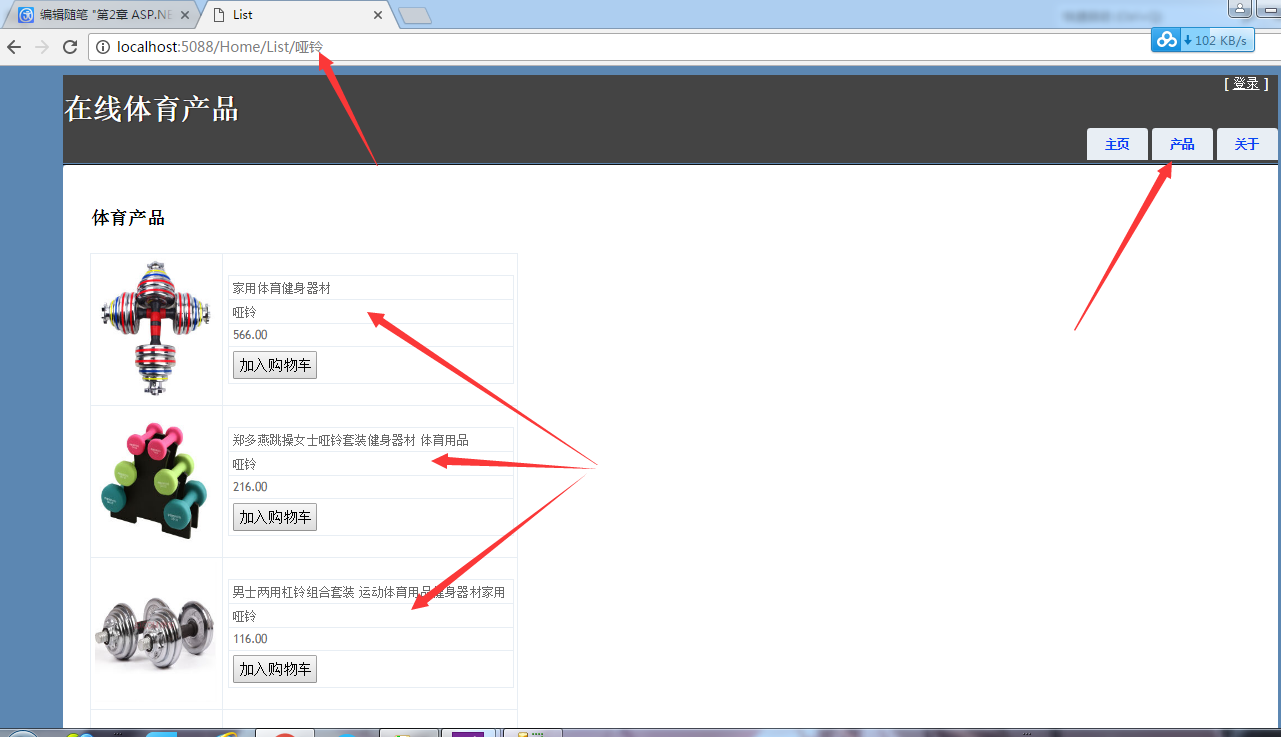ASPNET MVC URL、路由及区域
一、URL、路由及区域
一、 配置路由器
1、 URL模式
2、 定义路由默认值
3、 使用静态URL
4、 Route顺序
5、 自定义段变量
6、 使用action方法参数
7、 通过浏览器传参数
1、 在路由表中定义路由,需要对参数命名
2、 获取参数值:
1)、通过控制器中的action方法,如List(string cate),需要方法中的参数名和路由表中的参数相同,RouteData.Values[Key]获取,key为参数名,如果获取的是对象,可以通过模型绑定机制实现
二、 生成输出的URLS
1) 视图中静态链接
1、ActionLink:对应控制器/动作,使用默认路由
参数:new{参数=值,…}
样式:new{@class=样式名}
2、RouteLink:使用指定路由
格式:<a/>:控制器/动作/参数
2) 动态转向
1、 Redirect(url):参数是url地址
2、RedirecrToAction(action,Name,controllerName),参数为动作名和各种控制名
3、 RedirectToRoute(routeName,routeValues),转向到指定路由
routeName:路由名
routeValues=new{controller=value,action=value,id=value}
二、结合第一章MVC内容,设置产品分类显示
1、在"MVCProduct"项目单击右键添加“区域”,名字设为“Areas”
如图所示:
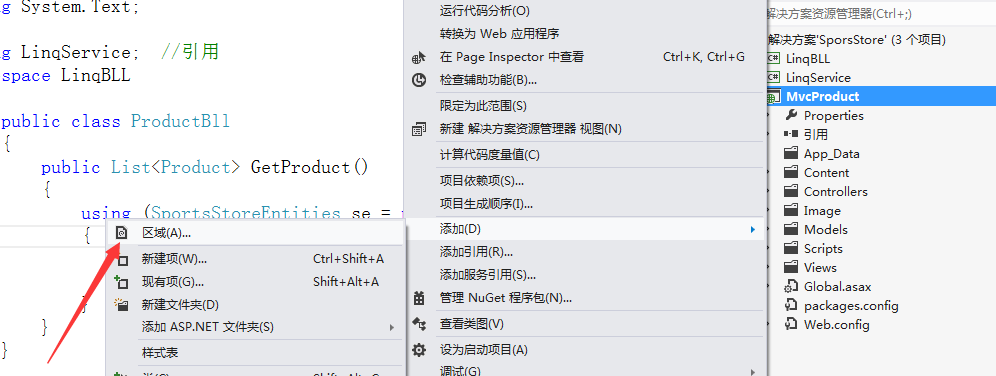
2、在“Areas”文件里面的“Controller”文件添加“控制器”名为“HomeController”
如图所示:

3、继续在“Areas”文件里面的“Controller”文件添加“控制器”名为“HomeController.cs”页面方法里"Index()"添加一个视图
如图所示:

三、设置”路由“添加路由参数“
如图所示:
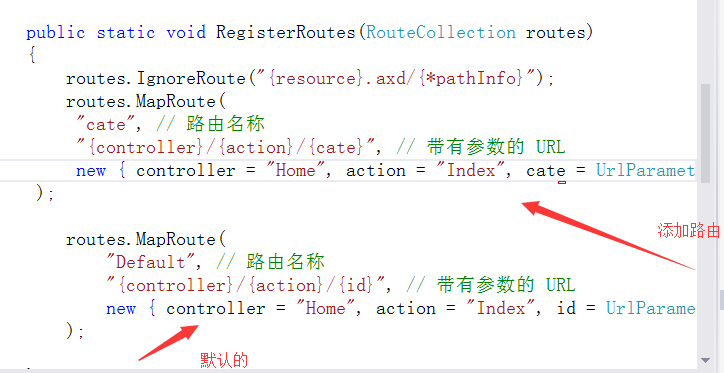
四、给"路由"添加对应"控制器名字",名字可以在"Controller"文件里面"HomeController.cs"页面
如图所示:

五、复制名字后,把它放在"路由参数里面"
代码示例:

using System; using System.Collections.Generic; using System.Data.Entity; using System.Data.Entity.Infrastructure; using System.Linq; using System.Web; using System.Web.Mvc; using System.Web.Routing; namespace MvcProduct { // 注意: 有关启用 IIS6 或 IIS7 经典模式的说明, // 请访问 http://go.microsoft.com/?LinkId=9394801 public class MvcApplication : System.Web.HttpApplication { public static void RegisterGlobalFilters(GlobalFilterCollection filters) { filters.Add(new HandleErrorAttribute()); } public static void RegisterRoutes(RouteCollection routes) { routes.IgnoreRoute("{resource}.axd/{*pathInfo}"); routes.MapRoute( "cate", // 路由名称 "{controller}/{action}/{cate}", // 带有参数的 URL new { controller = "Home", action = "Index", cate = UrlParameter.Optional }, // 参数默认值 new[] { "MvcProduct.Controllers" } ); routes.MapRoute( "Default", // 路由名称 "{controller}/{action}/{id}", // 带有参数的 URL new { controller = "Home", action = "Index", id = UrlParameter.Optional }, // 参数默认值 new[] { "MvcProduct.Controllers" } ); } protected void Application_Start() { AreaRegistration.RegisterAllAreas(); // 默认情况下对 Entity Framework 使用 LocalDB Database.DefaultConnectionFactory = new SqlConnectionFactory(@"Data Source=(localdb)\v11.0; Integrated Security=True; MultipleActiveResultSets=True"); RegisterGlobalFilters(GlobalFilters.Filters); RegisterRoutes(RouteTable.Routes); } } }
如图所示:
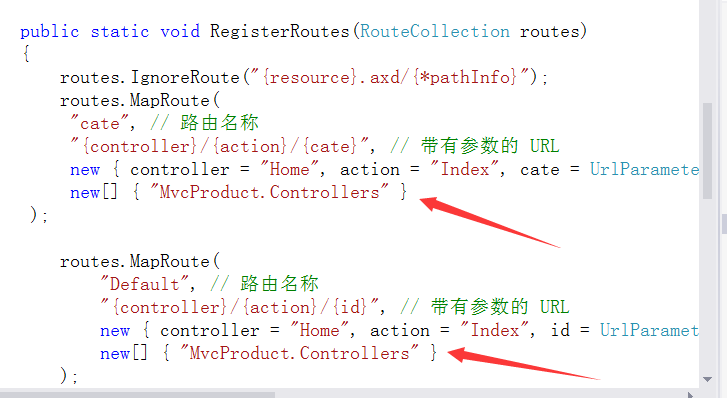
六、在"表示层"添加一个根据名字分类方法
代码示例:

using System; using System.Collections.Generic; using System.Linq; using System.Text; using LinqService; //引用 namespace LinqBLL { public class ProductBll { public List<Product> GetProduct() { using (SportsStoreEntities se = new SportsStoreEntities()) { var products = se.Product; //数据库里面表名称 return products.ToList(); } } //通过分类名获取体育产品列表 public List<Product> GetProductByCateName(string cate) { using(SportsStoreEntities se=new SportsStoreEntities()) { if (string.IsNullOrEmpty(cate)) { var products=se.Product; return products.ToList(); } else //查找对应分类数据 { var books = from a in se.Product where a.Name.Contains(cate) select a; return books.ToList(); } } } } }
如图所示:

七、最后在"MvcProduct"项目调用方法可以了,把之前方法注释掉
代码示例:

using System; using System.Collections.Generic; using System.Linq; using System.Web; using System.Web.Mvc; using LinqBLL; using LinqService; namespace MvcProduct.Controllers { public class HomeController : Controller { ProductBll bll = new ProductBll(); public ActionResult Index() { ViewBag.Message = "欢迎使用 ASP.NET MVC!"; return View(); } ////获取产品 //public ActionResult List() //{ // List<Product> ps = bll.GetProduct(); // return View(ps); //} public ActionResult List(string cate) { List<Product> ps = bll.GetProductByCateName(cate); return View(ps); } public ActionResult About() { return View(); } } }
如图所示:
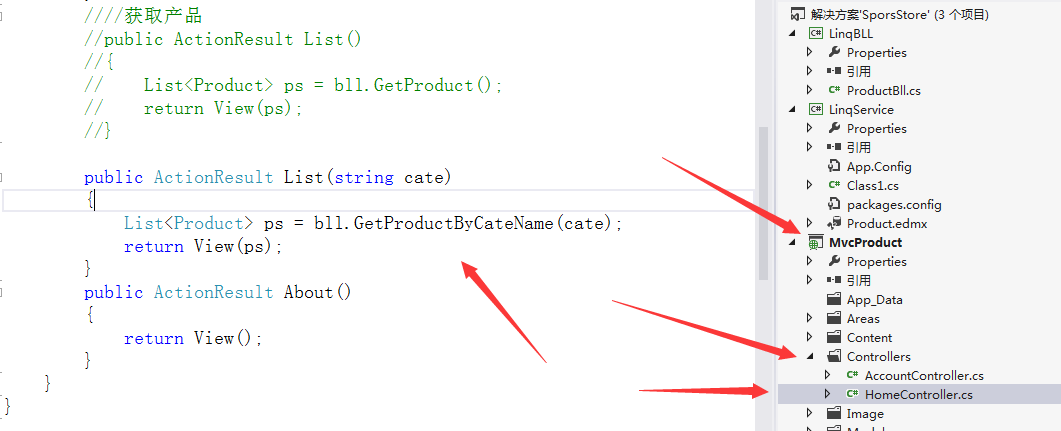
八、运行结果:输入要分类名称就可以了
